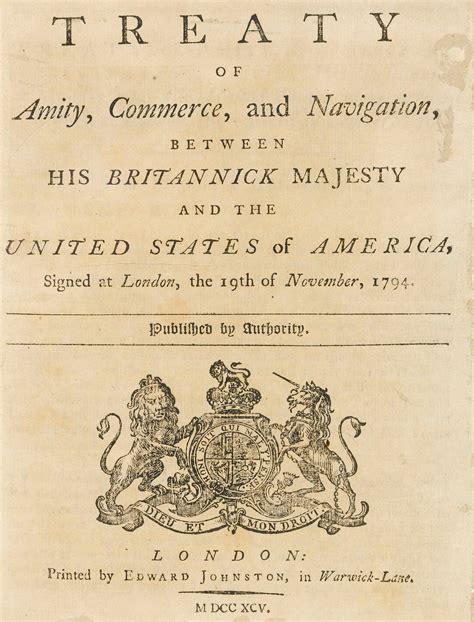The Jay Treaty, signed in 1794, was a controversial agreement between the United States and Great Britain that had a profound impact on the development of the young republic. The treaty, named after its chief negotiator, John Jay, addressed a range of issues, including trade, extradition, and territorial boundaries.

Background: A Post-Revolutionary Quandary
In the aftermath of the Revolutionary War, the United States and Great Britain found themselves in a tense and uncertain relationship. The United States, eager to secure its independence and territorial integrity, sought to resolve outstanding issues with its former colonizer. Great Britain, meanwhile, was determined to maintain its economic and strategic interests in the Americas.
Provisions of the Treaty
The Jay Treaty contained several key provisions:
- Trade: The treaty established commercial reciprocity between the United States and Great Britain, allowing for the free exchange of goods.
- Extradition: The treaty provided for the extradition of fugitives between the two countries, including those accused of treason.
- Territorial Boundaries: The treaty resolved several territorial disputes, including the evacuation of British forts in the American Northwest Territory.
Reactions and Consequences
The Jay Treaty sparked considerable debate and controversy in the United States. Supporters, such as President George Washington and Secretary of the Treasury Alexander Hamilton, argued that the treaty was necessary to prevent war with Great Britain and to secure economic benefits. They believed that the sacrifices made in the treaty were worth the price of avoiding conflict.
Opponents, led by Secretary of State Thomas Jefferson and Democratic-Republicans in Congress, vehemently denounced the treaty. They argued that it was a sellout to British interests and that it violated American principles of neutrality and republicanism. They feared that the treaty would undermine the gains of the Revolution and make the United States subservient to Great Britain.
Impact on American Politics
The debate over the Jay Treaty had a significant impact on American politics. It deepened the divide between the Federalists and Democratic-Republicans, who became the two dominant political parties in the early republic. The treaty also contributed to the growth of sectionalism, as the North generally supported the treaty while the South opposed it.
Legacy: A Long-Term Impact
The Jay Treaty had a lasting impact on American history. It helped to stabilize relations between the United States and Great Britain and to prevent war between the two countries. It also influenced the development of American foreign policy, emphasizing the importance of neutrality and avoiding entanglements in European affairs.
Assessment: A Mixed Verdict
Historians have debated the merits and drawbacks of the Jay Treaty for centuries. Some argue that it was a necessary evil that prevented war and secured economic benefits. Others maintain that it was a betrayal of American principles and a setback to the cause of republicanism.
Conclusion
The Jay Treaty was a complex and controversial agreement that played a pivotal role in the early history of the United States. It shaped the relationship between the United States and Great Britain, influenced American politics, and had a lasting impact on the development of the young republic.
